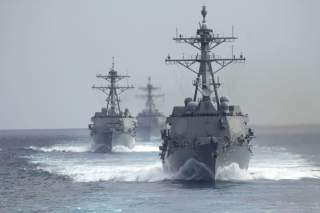Could Tensions in the South China Sea Spark a War?
And by the way...Washington could get dragged in.
Chilly Times Ahead
The future of these disputes is not promising for long-term peace and stability. Neither side has demonstrated any interest in backing down or compromising, and the potential for future escalation and crisis is high.
China’s approach to these disputes is particularly problematic. Its refusal to compromise, its continued reliance on escalation, and its commitment to change the status quo (no matter how gradually) is a recipe for persistent tension. Most troubling is the confidence with which China approaches escalation. Beijing appears to see escalation as a tool that can be used with absolute control and predictability. China’s strategists and policy makers are fairly new to major power geopolitics, and have not learned the lessons their American and Russian counterparts learned during the Cold War: that escalation is a dangerous tool, that an adversary can respond in very unpredictable ways, and that tension can quickly spiral out of control.
One problem on the near horizon is how China will react to the arrest of Chinese fishermen by the Philippines. Beijing will certainly react, and will again seek to punish Manila and strengthen China’s claims in the process. One option would be to arrest Philippine fishermen operating in waters claimed by China. Another more likely and more provocative response would be to evict the Philippine forces currently on the grounded Sierra Madre on the Second Thomas Reef. China has already harassed routine efforts by the Philippines to resupply those sailors, and may seek to tighten the blockade on the ship in order to force the sailors to withdraw. The potential for shots to be fired or another ship to be rammed and sunk would be high, and lives may be lost.
Without serious engagement, China is unlikely to back down. Beijing has painted this issue as directly related to its territorial integrity and national sovereignty, and its recent public marking of the 95th anniversary of the May 4 movement—in which the existing government was overthrown by a popular uprising that judged Beijing as weak in the face of foreign exploitation—strongly suggests that China’s leaders are sensitive to linkages between perceived weakness abroad and instability at home. With the growth of China’s economy likely to slow dramatically in coming years, Beijing appears to see incidents like these as useful in stirring nationalist sentiments at home to buttress the popular legitimacy of the Chinese Communist Party.
Should China use force against the Philippines, no matter how much Beijing may try to describe the act as defensive or reactive, the United States would probably be drawn into the crisis—certainly in a diplomatic sense, and potentially in a military sense as well. The United States will be unlikely to back down in such a situation, as the credibility of America’s willingness to intervene overseas has already come into question after decisions to not intervene in Russia’s invasion of Ukraine or Assad’s crossing the chemical weapons “redline” in Syria. While Washington would certainly attempt to de-escalate any crisis and prevent the use of force, it will also be sure to demonstrate will and resolve in order to both deter hostilities and reassure its allies.
While the United States is not a party to these disputes per se, it has a major interest in seeing them resolved peacefully. A conflict in the South China Sea would be disastrous for regional trade and for U.S.-China relations—both of which are of singular importance to the United States. The United States could enhance deterrence for Beijing by raising the costs to China for additional incidents—potential initiatives include further strengthening military cooperation with the other claimants in the South China Sea, building their military capabilities, and enhancing mechanisms for multinational training and exercises. Additionally, Washington should work as an honest broker among all parties to identify opportunities for de-escalation and to develop a roadmap to the peaceful resolution of disputes. The upcoming Strategic and Economic Dialogue is an important opportunity for Beijing and Washington to speak directly about these issues and the dangers they post, and to find a way to prevent a crisis.
China and other claimants in the South China Sea are on a collision course, and it is incumbent on the United States to demonstrate leadership by forestalling a future crisis that could throw the entire region into conflict. Unless the claimants are able to turn away from aggression and see de-escalation as a useful tool of strategy, it is only a matter of time until Beijing miscalculates and escalates over a redline that leads to crisis and raises the potential for conflict. A mix of countries with incompatible, apparently nonnegotiable interests willing to use force and unwilling to acknowledge any way out than the absolute capitulation of the other side is a highly dangerous mix—this is how wars start.
Abraham M. Denmark is Vice President for Political and Security Affairs at The National Bureau of Asian Research. He previously served as Country Director for China Affairs in the Office of the Secretary of Defense. He has visited China, the Philippines, and Vietnam in recent weeks and discussed these issues extensively in each country. The views expressed are his own. Follow him him Twitter: @AbeDenmark.
Image: Flickr/U.S. Navy/CC by 2.0

